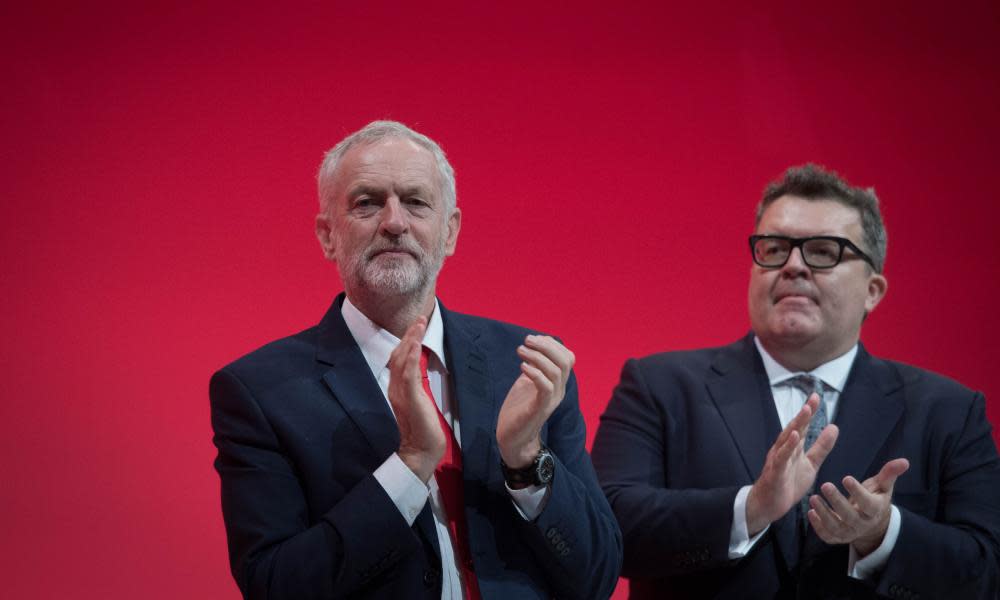Labour could stand up for young voters – if it stops the infighting | Phil McDuff

If you happen to leaf through the Prince’s Trust Youth Index report for 2017, you will invariably come away feeling some combination of depressed and bloody furious. This is “a generation that feels out of control”. Some 34% of young people think they will have a worse standard of living than their parents. A third feel like they aren’t in control of their job prospects, and 42% think “traditional goals like owning a house or getting a steady job are unrealistic”.
Many of them are out of work, and those who aren’t have low-paid precarious work. This contributes to feelings of hopelessness which increase the risks of mental health issues. We are raising a “scarred generation” of damaged young people.
They feel out of control but, as a generation, they saw through the political waffle that a Tory-led Brexit would give them that control back. Their parents and grandparents might be happy gifting Westminster the means for a centralised power grab, but young people know decisions made in parliament are likely to be as alienating as any made in Brussels, if not more so. Giving up seems pretty rational.
It’s also understandable that people would be growing increasingly frustrated with Labour. One of the complaints I hear most from people is how they just don’t know what Labour’s policies are. It’s probably surprising to a lot of people that, behind the scenes, Labour really have been working hard to come up with some policies that are genuinely quite good. I only found out because I’m a politics nerd, and so I paid £10 as a “supporter” and schlepped along to one of their New Economics events in Newcastle on a rainy Saturday.
I came out actually quite impressed with a lot of it. Their policy proposal of offering employees first right of refusal to buy firms that came up for sale before any asset-stripping multinationals, for example, resonates on a “take back control” level and also makes a huge amount of economic sense. There is copious evidence that increased workplace democracy improves performance and productivity, as well as worker satisfaction.
Likewise they have been working with the people behind the Evergreen Cooperatives project in Cleveland, Ohio, to explore ways of reinvigorating post-industrial communities and engaging people meaningfully in the decisions that impact their lives. They are looking not just at theoretical models, but talking to people who have walked the walk and made these ideas a reality under difficult economic circumstances. It’s also clear that John McDonnell is very passionate about developing what he referred to as the “heroes and heroines” of Labour – new talent in parliament and local government who are stepping up to the plate and getting their hands dirty, pushing forward with a practical radicalism aimed at meeting people’s needs rather than just appealing to their fears.
What wasn’t talked about, however, was telling anyone about this. Labour’s communication strategy remains woeful, and it lacks the means to develop a grand narrative that ties this all together, or a way of getting out of the “but you caused the last crisis through your profligacy” trap.
Brexit has exposed a faultline in the British electorate that Labour’s traditional voter coalition sits on both sides of
It feels as if the split in the parliamentary party right now is between people with good ideas who can’t figure out how to talk about them to more than 200 people at a time, and people without any good ideas but plenty of media nous. Tom Watson used his media talents to get his weak-tea “Momentum are secret plotting plotters” stuff onto the news cycle for a couple of days, and that turned out to be all sizzle and no steak. There’s no sign that the Labour right have any actual ideas – certainly none they actually want to spend much time talking about. Nor is there any indication that their plans for winning an election extend beyond “anyone but Corbyn” – which historically minded readers will remember was the reason his opponents in two leadership elections looked like empty suits devoid of ideas.
I’ve always been somewhat of a Corbyn-agnostic – supportive of him in the absence of anyone else recognising the underlying conditions that produced him. As chalices go, the Labour leadership seems at present to be not merely poisoned but filled with urine, and therefore undesirable to anyone with the talent to do something with it. Brexit has exposed a new faultline in the British electorate that Labour’s traditional voter coalition sits on both sides of. His opponents see him as destroying the party, but by giving them something to focus on it’s possible that he’s the only thing holding it together. If the focal point of “Is Jeremy Corbyn very good or very bad?” suddenly vanishes, the ensuing clamour of candidates trying to balance “genuine concerns” v “oppose Brexit” doesn’t seem likely to usher in a new era of party unity.
The current shadow cabinet is full of people who are chock full of good ideas but unable to get them across. The moderates know how to get the media to pay attention, but are choosing to get it to pay attention to internal fights. Imagine how much better it would be if those wings worked together for a change?
The scarred generation deserves better than a Labour party torn apart by people pretending all their problems are caused by other people. Underemployed young people can’t get hope for the future if all Labour is concerned about is who holds what seat on the NEC. This is all eminently changeable, but only if the party puts its focus back onto the people that need them and not onto its own squabbles and spats. If it can’t do that, it doesn’t deserve their votes anyway.

 Yahoo News
Yahoo News 
